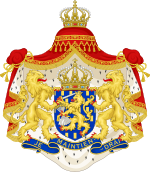- Dutch general election, 1922
-
Netherlands 
This article is part of the series:
Politics and government of
the NetherlandsConstitutionCabinetDecentralized gov'tForeign policyRelated subjects
A general election of the House of Representatives of the Dutch Parliament was held in the Netherlands on July 5, 1922. It was the first election under universal suffrage, which became reality after the acceptance of a proposal by Marchant in 1919 that gave women full voting rights[1]. An amendment which raised the amount of votes required to win a seat in the House of Representatives significantly reduced the amount of political parties that were able to obtain a seat.
The confessional parties benefited the most from this amendment, with all three of them winning more seats. The RKSB went from 30 to 32 seats, the ARP from 13 to 16 seats, and the CHU went from 7 to 11 seats. On the rightwing side, the Christian Democratic party and the Christian Social Party both lost their sole seats, disappearing from the House, while a newcomer, the SGP, managed to obtain one seat. The SGP, an orthodox Protestant party established in 1918, was opposed to the cooperation of the protestant ARP and CHU with the Catholics.
The SDAP lost two seats, going from 22 to 20 seats. The left-wing splinter parties also suffered losses, and went from four to two seats.
The Liberals, who in 1921 were united in 'the Freedom League', sank away further. Of the 15 seats they managed to retain only ten. However, a new Liberal Party led by the 85-year-old Samuel van Houten, obtained 1 seat in the House. Van Houten himself did not take the seat, which was instead occupied by his representative, Lizzy van Dorp.
The liberal Democrats maintained, against most expectations, their five seats.
Of the remaining splinter parties, only the Peasants' League was able to survive, actually rising from one to two seats. Their new leader was 'Farmer Braat', whose clumsy performance earned him little respect.
Noticably, almost all major parties had a woman elected. The number of female representatives increased from one to seven. Only the ARP principally excluded women from the House of Representatives.
After a relatively short formation, the second Cabinet-Ruijs de Beerenbrouck formed, with largely the same composition as the first Cabinet-Ruijs.
Contents
National summary
Summary of the 5 July 1922 Dutch House of Representatives election results Parties Lijsttrekker Votes Seats +/- Vote % General League of Roman Catholic Caucuses (RKSB) Wiel Nolens 874745 32 +2 29,86% Social Democratic Workers' Party (SDAP) Pieter Jelles Troelstra 567769 20 -2 19,38% Anti Revolutionary Party (ARP) multiple, including Hendrikus Colijn, Jan Schouten and Theo Heemskerk
402277 16 +3 13,73% Christian Historical Union (CHU) Jan de Schokking 318669 11 +4 10,88% the Freedom League (de Vrijheidsbond) multiple 271358 10 -5 9,26% Free-thinking Democratic League (VDB) Henri Marchant 134595 5 4,59% Communist Party of the Netherlands (CPN) David Wijnkoop 53664 2 -1 1,83% Peasants' League (Plattelandersbond) Arend Braat 45816 2 +1 1,56% Liberal group Samuel van Houten 28050 1 +1 0,96% Reformed Political Party (SGP) Gerrit Kersten 26744 1 +1 0,91% Total (turnout 88.78%) 2.929.569 100 0 Parties
- Anti Revolutionary Party (Anti-Revolutionaire Partij)
- Agrarians' League (Plattelandersbond)
- Christian Historical Union (Christelijke-Historische Unie)
- Communist Party of Holland (Communistische Partij Holland), continuation of Social Democratic Party
- Freedom League, merger of Liberal Union, League of Free Liberals, Economical League, Neutral Party and Middle Class Party
- Freethinking Democratic League (Vrijzinnig Democratische Bond)
- Liberal Party (Liberale Partij)
- Political Reformed Party (Staatkundig Gereformeerde Partij), offshoot of the Anti Revolutionary Party
- Roman Catholic League of Electoral Associations (Roomsch-Katholieke Bond van Kiesvereenigingen)
- Social Democratic Workers' Party (Sociaal-Democratische Arbeiderspartij)
References
External sources
 Elections and referendums in the Netherlands
Elections and referendums in the NetherlandsGeneral elections European elections Referendums Categories:- Elections in the Netherlands
- 1922 elections in Europe
- 1922 in the Netherlands
Wikimedia Foundation. 2010.
